“We brought you from the hospital!” this was the answer one of my ex-colleague gave to her then 4 year old son, when he asked “where did he come from?” He started crying inconsolably saying that they are not his real parents and that his friend’s mom kept him in his tummy and that he was their real child! The parents obviously had to do damage control and spent substantial time to correct their mistake. The incident was funny but also a lesson on how casually or incorrectly we deal with such innocent curiosities that lies within the realm of ‘Sex’ and ‘Sexuality!’ This becomes more of a challenge when the children in context have special needs, making it difficult for them to put across their issues and questions and critical for us to answer in the way that they understand.
Any topic related to sex and sexuality is a nightmare for many of us parents and while we try our best to deal with the situations that catch us off guard, we need to be prepared for this phase in our children’s life which can be incomprehensible, complicated and confusing for them. This is the reason I invited Dr. Nina Vaidya, who is a practicing paediatrician, a mother of two, a 25 year old son and a 23 year old girl with Down Syndrome, to write a guest post for us. Dr. Nina runs her hospital in Navsari, Gujarat. She also runs a residential school for children with special needs and talks extensively on issues pertaining to disabilities at state, national and international levels. She passionately shares some great strategies for children with special needs on her blog www.drninapiyush.blogspot.com. In this article, she has given extensive guidelines for parents to learn more about this critical and not so comfortable topic for many. I am sure that while you may find this article a little long but you’d learn a lot just like I did and will find it extremely insightful and helpful. Let’s read her expert advice:

The problem with most of us parents is that we are not trained to deal with this topic. We dread it, avoid it and ignore it. And the fact is that this fear has only been created by our own prejudices. If you think of it logically it is as simple as making your child learn to brush his teeth or comb his hair. Also It’s not only about special children; for parents, talking about sex & related issues is equally difficult even when the typical children are concerned. But because typical children have access to books, television, movies, magazines, peers & other sources, usually with time without creating much of untoward consequences, things get resolved.
One thing that we all have to understand and believe is that there is no specific age to educate the child about sex and sexuality. Earlier you start; the better it is for the child to be comfortable with his self.
There are two important topics, sex education & sexual abuse. Both the topics are inter-related but We’ll deal with the sexual abuse in a later post and first discuss only about sexual education so they are better prepared to learn about sexual abuse.
HOW TO GO AHEAD WITH SEX EDUCATION AT HOME
To start with sex education it is important that we teach children about all the following things
- Personal hygiene and cleanliness.
- Private and public
- Pre-pubertal change & Onset of puberty
- Menstruation
- Masturbation &
- Nocturnal ejaculation
As we know our children are visual learners and they learn optimum through pictures, charts, diagrams, demonstrations, flashcards, rhymes & songs; we will have to use them in abundance. I will give few examples but you can have plenty of your own creations to make the child understand conceptually.
We will use the following symbols excessively in our entire journey of rearing a child having special needs. You can use other symbols i.e happy face/sad face to reinforce positive or negative behaviours.

It is all about knowing the body. It is all about feeling the sense of possessiveness. It is all about a sense of privacy & personal belongingness. To create this the first step is:
1. Awareness about Personal Hygiene & Cleanliness
Help your child learn about the ways to keep the body clean, the reasons behind, how he/she looks when clean.
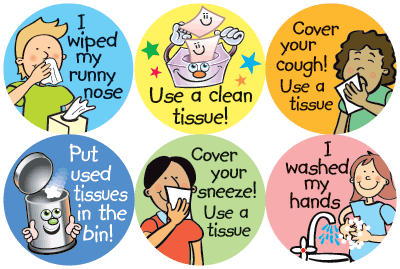
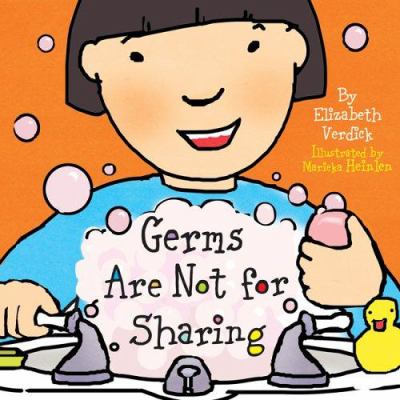


There are many charts, images, activities, worksheets etc. through which you can reinforce the learning. Talk about various simple routine tasks like ‘Why drying the body properly after bath is important. And ‘ why do we need to pay more attention to underarms, groin, web spaces, external genitals & buttocks.’
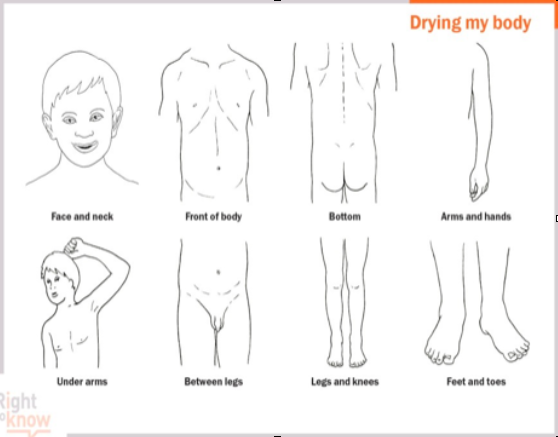
This will serve two purposes. One, the child will learn the importance of drying the body & second, the child will feel free to talk about the private parts as & when needed.
2.Private & Public
Though teaching about ‘private’ and ‘public’ may seem easy but for our children to put it into context and generalise can be difficult. To help them better understand the concept we need to target the concept differently. Start with places that are private/public. Behaviour- private/public. Manners-private/public. Make it an activity based learning with the help of pictures, cards, books, magazines, news paper etc. For example; mix pictures of public places & private places then ask your child to separate them.
 |
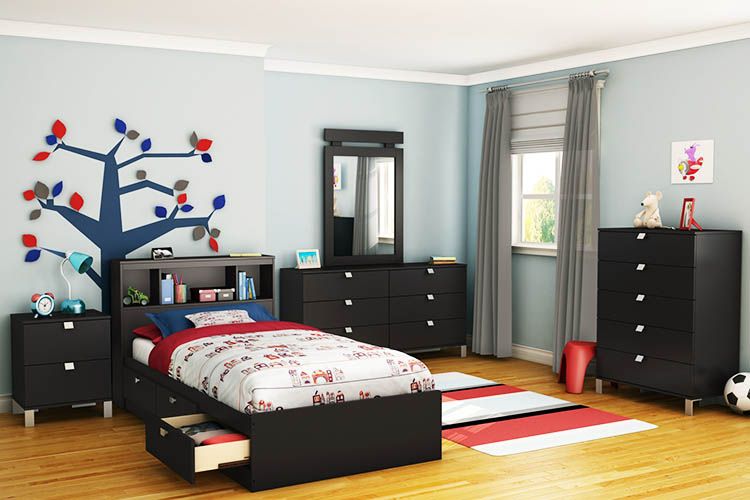 |
 |
 |
Similarly gather some pictures, photos, clipart, cards of acceptable behaviour & unacceptable behaviour, good manners/bad manners. Use the right/wrong symbols & make the child understand the difference. If needed use the REWARD METHOD each time when child follows or answers correctly.
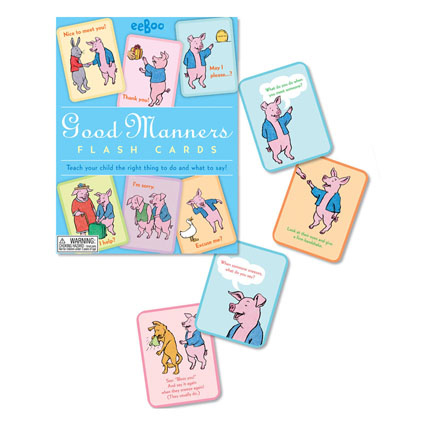
Simultaneously focus on privacy. First of all we need to maintain the discipline of privacy. We need to DISCOURAGE the child for;
- Dressing and undressing in public/with door kept open.
- Running naked between bathroom and bedroom.
- Leaving the door open while using the toilet.
- Changing into/out of swimwear at the pool/beach.
- Pull down wet cloth/pant in a public room at home.
- Parents/grandparents not maintaining privacy.


We need to take care for the following;
- Help your child to bathe but don’t take bath with your child. When you being an adult take bath with your child, the message transferred to your child is, ‘it’s okay to remove cloths even when grown up’.
Yes, you can enjoy bathing together keeping the SWIM SUIT RULE.
- Don’t change cloths in front/in presence of your child.
- Close the door of your room while changing.
- Don’t keep the doors open while using the bathroom/toilet.
The following messages need to be transferred with clarity.
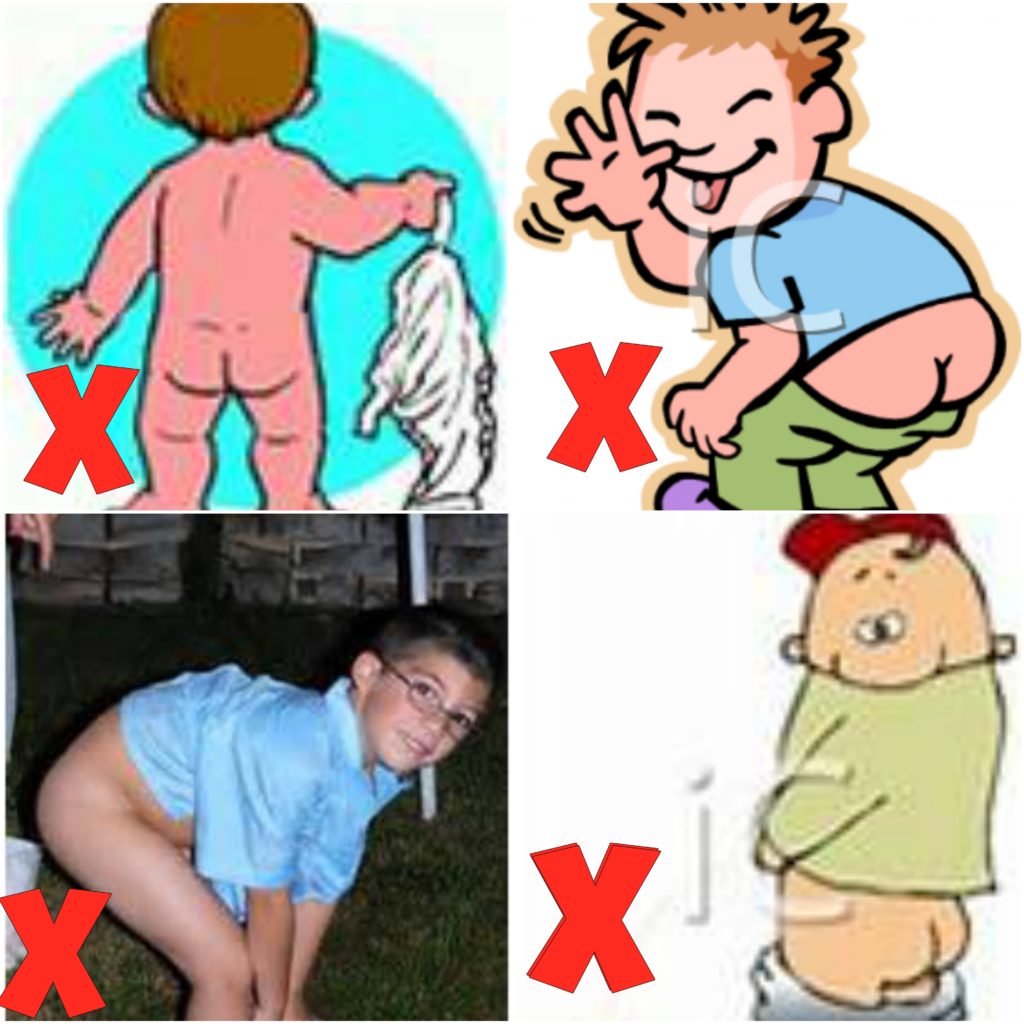

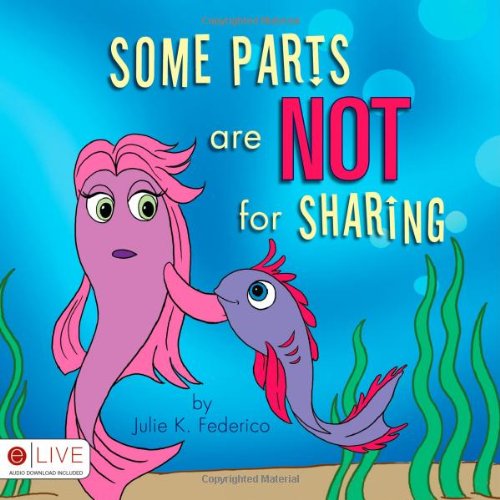
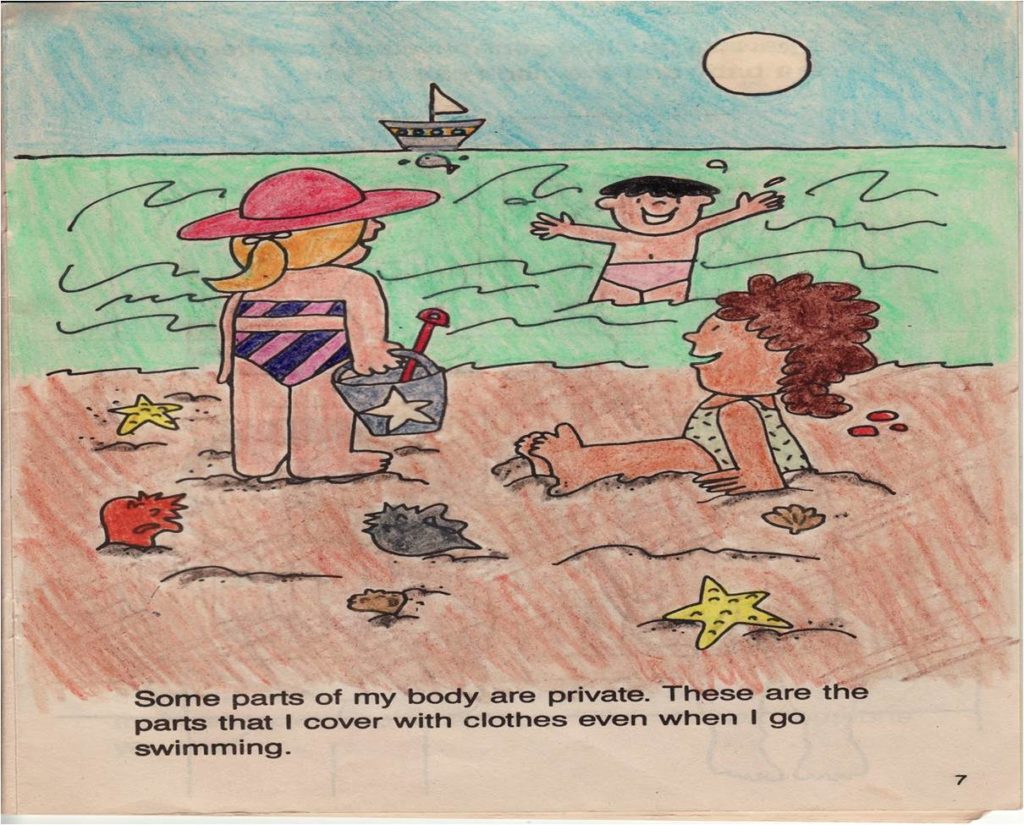

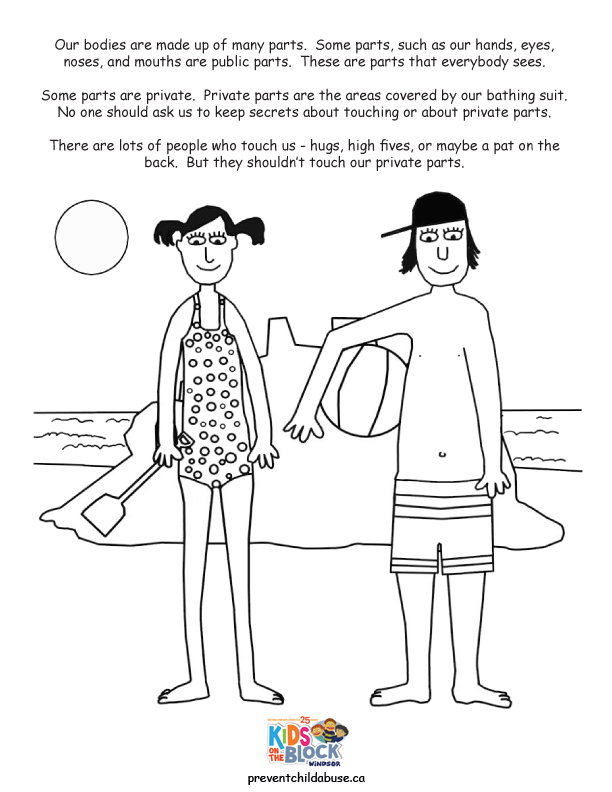
Take pictures/flashcards of different body parts and ask the child to separate those under three headings,
- Always uncovered unless special condition like extreme cold/some injury. (palm, ears, eyes, nose, lips, face, neck….)
- May or may not be covered & it is ok if uncovered.(hands, legs below mid thigh, tummy)
- Always covered (the swim suit area)
Before going to the next step make sure you are done with the following things.
- Given them the Ownership of Their Body
- Used Appropriate Language
- Kept Conversation Light and Easy
- Used the Swim Suit Rule
- Used Books/cards/pictures etc. & made the Private/Public concept clear.
3. Pre-pubertal changes
Collect your photos right from your childhood & arrange them stepwise, this would facilitate to talk about the physical changes.If talking with a daughter you can say that bodily she will look like mom & if boy, you can say that bodily he will look like dad. Show them how you looked when you were of his/her age. Help Them Trust Their Feelings. Emphasise more on hygiene part, cleaning the pubic region & the underarms. Help your child to remove hair from these areas in whatever way suitable to you & your child. Be careful about maintaining the privacy. Now it is time to talk about the pre-pubertal changes leading to ONSET OF PUBERTYwith pictures.


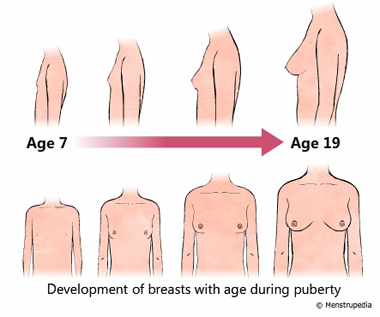

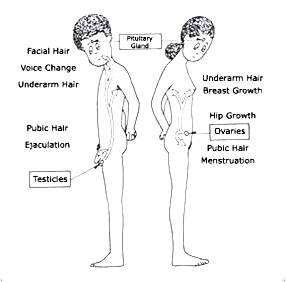
4. Menstruation

TEACHING ABOUT THE CYCLE

Take a planner and during the pre-pubertal stage (Breast buds, coarse pubic hair & under arm hair) of your daughter ask her to note down your (mother’s) menstrual cycle. Within a spell of 6-8 months she will understand that this is a cycle of 25-30days & lasts for 4-6 days. Then explain her that this happens with all & shortly will happen to her as well.
Explain the use of sanitary napkins/tampons.
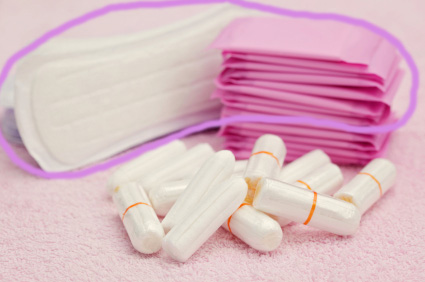
Now the hygiene during Menstruation.
- Choose your method of sanitation:
Frequent switching between brands can make you uncomfortable since brands are as unique as you, they suit everyone differently. Be careful while using tampon for the first time.
- Change regularly:
Menstrual blood – once it has left the body – gets contaminated with the body’s innate organisms. This rule applies for even those days when you don’t have much bleeding. The standard time to change a sanitary pad is once every six hours, while for a tampon is once every two hours. If not done it can lead to conditions like urinary tract infection, vaginal infections and skin rashes..
- Wash yourself regularly:
It is important to wash your private part well before you change into a new pad. If you cannot wash yourself before you change make sure to wipe off the areas using toilet paper or tissue.
- Don’t use soaps or vaginal hygiene products
The vagina has its own cleaning mechanism that works in a very fine balance of good and bad bacteria. Washing it with soap can kill the good bacteria making way for infections. So, while it is important to wash yourself regularly during this time, all you need to use is some warm water. You can use soap on the external parts.
- Use the right washing technique:
Always wash or clean the area in a motion that is from the vagina to the anus. Females have an open system, washing other way round can cause urinary tract infection.
- Discard your used sanitary product properly
It is essential to discard your used napkins or tampons properly because they are capable of spreading infections. Wash your hands well after you discard your used napkin.
- Beware of a pad rash
A pad rash is something that you might experience during a period of heavy flow. To prevent this from occurring, try to stay dry during your periods. If you do have a rash, change your pads regularly and stay dry. Apply an antiseptic ointment, after a bath and before bed
- Use only one method of sanitation at a time
Even when you have heavy flow do not use either (i) two sanitary pads, (ii) a tampon and sanitary pad (iii) a sanitary pad along with a piece of cloth. This can lead to rashes and infections. Using a piece of cloth is not a good idea as cloth may not be the cleanest thing to put next to your private parts. It is always better to change the pad frequently.
- Have a bath regularly
This is the best thing you can do for your body during your periods. It also helps relieve menstrual cramps, backaches, helps improve your mood.
- Be ready with on-the-go stuff during your periods
When you have your periods it is important to be ready. It is important to have extra sanitary pads or tampons properly stored in a clean pouch or paper bag, a soft towel, some paper tissues or towels, hand sanitizer, a healthy snack, bottle of drinking water, a tube of antiseptic medication. (if you are using one).
5. Masturbation

If a child of 5 years or may be 8-9 years is doing something with his genitals, we label that act as an act of MASTURBATION. This is not the case. Let us understand why & when the child does so. The part lying between two legs is the most sensitive part of our body. Touching that part softly gives a sense of pleasure. When a child does not find anything interesting or pleasing in his/her surrounding, to get instant pleasure the child starts playing with the genitals. This is equally applicable to an adolescent as well but for an adolescent boredom cannot be the reason always.
Masturbation is common throughout life, both for men and women. Children masturbate from an early age, although the behaviour usually increases during adolescence. Masturbation is a healthy thing for children and adults to do, but many people still feel guilty about masturbating. Masturbation may also be a symptom of non-sexual problems such as frustration, boredom, or loneliness. Masturbation may seem excessive because it occurs in inappropriate places. This may happen because an individual has no appropriate places to masturbate or because he or she hasn’t been taught where it is appropriate to masturbate.
Excessive masturbation may occur:
- when there are personal emotional problems
- when there is an irritation such as a skin rash
- when clothing is too tight
- when there is an infection
- when a physical disability affects sensitivity to pain or pleasure
- As an attention-getting behaviour
- when an individual has been sexually abused
Masturbation cannot be ignored:
- When it is done in a public place.
- When it is done in a private place (such as a bedroom), but when other people are around
- When it interferes with daily living (the individual no longer finds time for family or friends, other interests, schoolwork, or their job)
- When an individual is rubbing so hard or so often that there is soreness or bleeding
Individuals may need to learn the following things:
- Masturbation should be done in a private place at home, such as a bedroom or a bathroom with the door closed and the curtains drawn.
- Masturbation is a private behaviour that should be done alone.
- Clean up after masturbating – this includes wiping off the genitals, wiping up semen (for males), and washing hands.
- Masturbation should not be discussed in public places with family, friends, or strangers.
- Masturbation can be discussed in private with a doctor, nurse, parent, or other appropriate person.
Dealing with Inappropriate Masturbation
- Be clear about your rules.
- Respond to inappropriate masturbation in a calm, non-judgmental manner. Use clear language. For example, “It’s not okay to masturbate here. You can do that in the bathroom.”
- If possible, coordinate the messages given at home and at school or work, so that you and all school or work staff is giving consistent messages.
- Look for possible causes if the inappropriate behaviour persists.
Behaviour modification techniques can be applied to inappropriate masturbation. www.imwidu.blogspot.in
(BEHAVIOUR MODIFICATION TECHNIQUES)
- Possible techniques include:
- Encourage other, incompatible behaviours – your child won’t be able to masturbate if his hands are busy doing something else.
- Make the surrounding of your child interesting & pleasant.
- Reward appropriate behaviour or the absence of inappropriate behaviour.
- Extinguish attention-getting behaviour by ignoring it or calmly redirecting your child. This may be difficult – masturbation is a very private behaviour, and seeing it in public may cause feelings such as anger, fear, or disgust.
6. Nocturnal Ejaculation:
Also known as ‘ wet dreams‘ or ‘nocturnal emissions’.
A wet dream is when a boy ejaculates while asleep.
THE FACTS:
When a boy goes through puberty, body starts producing the male hormone testosterone. Testosterone plays a key role in the development of male reproductive organs such as the testis and prostate. Semen is produced by these organs. One way that semen gets released is with a wet dream. During puberty, an adolescent starts having erections at all different times of the day — in school, while watching TV, in the shower. He can even have an erection while asleep. Wet dreams are a normal part of growing up. There’s nothing you can do to control or stop wet dreams. Not every teenage boy has wet dreams.
You don’t need to explain in detail about all these. Talk with your child as per his needs. Make sure to maintain the hygiene. Teach him to clean himself after he wakes up. Wash the genitals with soap and water, including the area underneath the foreskin.
Talking about ‘Sex’ and ‘sexuality’ is only as difficult as you make it to be. Talking about my experiences with parents, I feel the parents need a lot of understanding. During my parenting sessions, I have seen parents & children breaking the privacy rules and no one is bothered. And when it’s time for the question/answer session, parents hesitate to ask. So once I did an anonymous Q/A sessions & 60-70% of questions were related to masturbation, menstruation, removing cloths in public, grown up boys touching private part of a girl/lady, a grown up sitting in lap-hugging every now & then and so on. The most shocking thing was that each one wanted these issues to be answered privately! Why? What is so special about sex? As our body organs needs nutrition and we eat food our physical drive needs sex. Yes, there is no alternative for food but the sexual urge can be handled/tackled tactfully with proper understanding & EMPATHY.
Growing physically is always accompanied by growing sexually. This is a normal milestone. Parents worry about other milestones when not achieved on time, similarly it is a matter of worry if any time after the age of 11-15 your child is not showing signs of primary & secondary sexual characters. So relax, breathe deep. This not a war. This is not something to feel ashamed about. This is not something to hide. Try and think about how you felt when you entered your teens? And you will find ways to have a positive communication with your child.
Happy Parenting!
Image credit
www.234forum.com, www.iidc.indiana.edu, www.yourwonderfullife.tv, www.slideshare.net, www.nspcc.org.uk, blog.whatsupnewdelhi.com, behomezz.com, www.saigon-gpdaily.com.vn, adamsconstruction.co, virtual-lecture-hall.com, menstrupedia.com, www.abpischools.org.uk, menstrualcupreviews.net,turningteen.wordpress.com, slideplayer.com, worldartsme.com







Good work on less comfortable topic.
Good work on untouched topic.